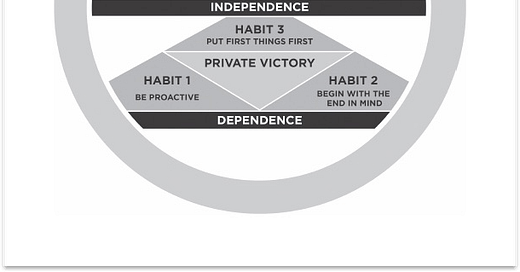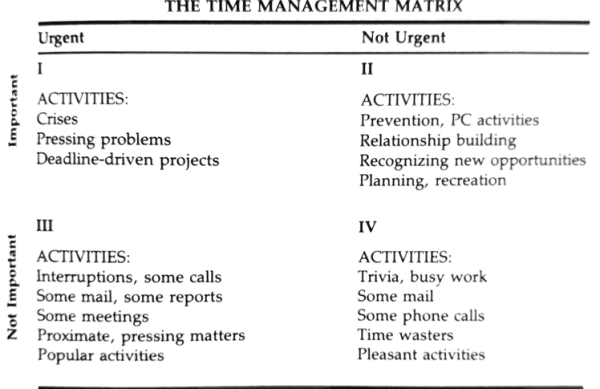7 Habits of Highly Effective People by Stephen Covey
What you practice daily becomes who you are — Covey shows you how to choose wisely. (Essential Reads 9)
Some books fade with time. Others, like The 7 Habits of Highly Effective People by Stephen Covey, only grow more relevant.
Stephen Covey’s timeless book on how to live a life rooted in principles will challenge you to think and act in service of others. More than just a guide on how to be effective, this book becomes a companion for personal reflection at any stage of life.
This post goes deep into the essence of Covey’s thinking, drawing from direct notes and core insights of the book. It’s designed to unpack not only the habits but also the paradigms, principles, and wisdom behind them.
Inside-Out:
Covey begins by showing that change starts from within. We see the world not as it is, but as we are conditioned to see it. Being is seeing in the human dimension. And what we see is highly interrelated to what we are. We can't go very far to change our seeing without simultaneously changing our being, and vice versa.
Our paradigms — formed by experience, culture, and upbringing — shape everything. The first step to effectiveness is becoming aware of those paradigms, questioning them, and aligning them with timeless principles rather than subjective values.
Be The Change You Want To See
"Inside-Out" means starting first with the most fundamental part of ourselves — our paradigms, character, and motives.
Private victories precede public victories. Before we can achieve public victories, we must secure private victories: mastering ourselves, honoring commitments to ourselves, and refining our thinking. If you want to have a happy marriage, be the kind of person who generates positive energy.
Covey references Albert Einstein: "The significant problems we face cannot be solved at the same level of thinking we were at when we created them." This highlights the necessity of deep inner change and paradigm shifts.
Paradigms are powerful:
We do not see the world as it is, but as we are. Covey illustrates this with the famous optical illusion of a young woman and an old woman: two sincere, intelligent observers can look at the same image and see two completely different realities.
The lesson: sincere people can disagree and both be right, because each is viewing life through their own mental map. The more conscious we become of these paradigms, the more we can choose to challenge and realign them with universal principles.
Habit 1: Be Proactive
Between stimulus and response lies the freedom to choose.

Covey emphasizes that proactive people recognize their ability to subordinate impulses to values, while reactive people surrender to conditions. He explains the Circle of Concern vs. Circle of Influence: reactive people focus on problems they cannot control, shrinking their influence, while proactive people focus on actions they can take, expanding their influence.
Reactive language (“I can’t,” “They make me”) becomes self-fulfilling prophecy, reinforcing helplessness. Proactive language (“I choose,” “I will”) empowers and expands one’s circle of influence.
Covey states: “Any time we think the problem is ‘out there,’ that thought is the problem.” Proactivity is not aggression but intelligent, value-driven initiative.
Key lesson: Until you internalize that “I am what I am today because of the choices I made yesterday,” you will never genuinely believe “I can choose otherwise.” Self-mastery starts here.
Habit 2: Begin With the End in Mind
Covey urges us to visualize the end — not just in goals but in life’s ultimate legacy. Imagine your funeral: what do you want people to say about your character and contributions? This exercise crystallizes what matters. Without clear personal leadership, life becomes reactive, driven by external agendas.
All things are created twice: first mentally, then physically. Peak performers (athletes, artists, leaders) visualize success before acting. Covey teaches that leadership (deciding what’s important) must precede management (doing things efficiently). Many families, organizations, and individuals falter because they manage without direction.
The mission statement: This is not a slogan but a constitution — your foundation for decision-making. It defines what you want to be (character), what you want to do (achievements), and the principles guiding both. Covey warns: without a principle-centered mission, you risk building success on a fragile, shifting foundation.
Habit 3: Put First Things First
This habit is the practical fulfillment of Habits 1 and 2.
Covey’s Time Management Matrix (Quadrants I-IV) teaches that urgent things aren’t always important, and important things are rarely urgent. Quadrant II (important, not urgent) — activities like planning, learning, relationship-building, and prevention — is the heart of effective personal management.
Effective people are not problem-minded; they’re opportunity-minded.
The courage to say no
The “enemy of the best is often the good.”
Without the discipline to prioritize Quadrant II activities, life becomes reactive and crisis-driven. Time for Quadrant II activities must come from consciously cutting out Quadrants III and IV.
Saying “yes” to strategic work requires saying “no” to distractions, busywork, and even urgent but unimportant demands. Most people lack clarity on priorities because they lack a principle-centered mission. Without that foundation, they cannot confidently decline lesser obligations.
Delegation mastery
Effectively delegating to others is perhaps the single most powerful high-leverage activity there is.
Gofer delegation = Do this and tell me when it’s done. Focuses on micro-managing how it’s done. This is ineffective.
Stewardship delegation = Focused on results instead of methods. Let’s the other person choose their method, but gives them ownership over the results. Much more effective.
The latter requires defining desired results, guidelines, resources, accountability checkpoints, and consequences. Done right, delegation becomes the most powerful productivity multiplier.
You can’t think efficiency with people.
Be effective with people and efficient with things. Relationships require spontaneity, empathy, and flexibility.
Emotional Bank Account
You need to invest more than you withdraw from the Emotional Bank Account to have productive relationships. This becomes especially critical with those you interact with frequently. Covey outlines six major deposits that build trust:
Understand the Individual: Truly knowing what counts as a deposit to the other person; what matters to them.
Attend to the Little Things: Small courtesies and kindnesses strengthen relationships; the big things are often small gestures done consistently.
Keep Commitments: Always fulfill the promises you make; they are trust’s foundation.
Clarify Expectations: Most relationship breakdowns stem from conflicting or ambiguous expectations.
Show Personal Integrity: Align actions with words; be loyal to those not present, which builds trust among those who are.
Apologize Sincerely When You Make a Withdrawal: A heartfelt apology can rebuild trust, but repeated insincere apologies do more harm than good.
Habit 4: Think Win/Win
In an interdependent world, anything less than Win/Win is a poor compromise. Covey insists that if a true Win/Win is not possible, it’s better to go for No Deal rather than erode trust. Win/Win relationships are built on character traits: 1. integrity, 2. maturity (the balance between courage and consideration), and an 3. abundance mentality — the belief that success is not zero-sum.
Trust is sustained through continual emotional bank account deposits. An agreement, no matter how detailed, is meaningless without character and trust.
Habit 5: Seek First to Understand, Then to Be Understood
This is the habit of empathic communication. Most people listen with the intent to reply, filtering everything through their own experience. Covey emphasizes that truly understanding someone else requires giving them psychological air — letting them be fully heard and acknowledged. Only then can influence occur.
Four Stages of Empathic Listening
Mimic Content
Rephrase the Content: It trains you to not only listen, but start to synthesize what they’re trying to say.
Reflect Feeling: Not paying as much attention to what’s being said as to the way they feel about what they’re saying.
Rephrase the Content AND Reflect the Feeling: As you authentically seek to understand, you give the other person psychological air.
Pathos, Ethos, Logos
Use ethos (integrity/competency), pathos (feelings), and logos (logic), in that order, to create compelling presentations.
Influence follows empathy, not logic alone. You cannot go straight to the logical side of your argument without first addressing pathos and ethos.
Habit 6: Synergize
Synergy is creative collaboration that produces results no individual could achieve alone. Synergy means that the whole is greater than the sum of its parts.
The very strength of the relationship is in having another point of view. The key to valuing those differences is to realize that all people see the world not as it is, but as they are. Sameness leads to stagnation; Covey highlights that valuing differences — in perspective, background, and style — creates opportunities for innovation.
The person who is truly effective has the humility and reverence to recognize his own perceptual limitations and to appreciate the rich resources available through interaction with the hearts and minds of other human beings.
Habit 7: Sharpen the Saw
Effectiveness is impossible without regular self-renewal. Covey outlines four areas:
Physical renewal involves exercise, rest, and nutrition. Mental renewal comes from reading, writing, and continuous learning. Spiritual renewal means reconnecting with values, purpose, and reflection. Social and emotional renewal involves building relationships and serving others. Neglect in any area erodes overall capacity.
Sharpening the saw is a Quadrant II activity — not urgent, but vital. It sustains long-term effectiveness and prevents burnout.
Conclusion
The power of Covey’s work lies not in quick fixes but in enduring truths. These habits, built upon timeless principles, require conscious effort, deep reflection, and daily recommitment. They remind us that effectiveness is not about tactics or shortcuts but about character, clarity, and discipline.








